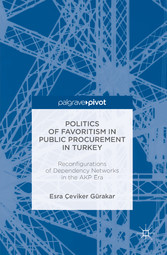Suchen und Finden
Politics of Favoritism in Public Procurement in Turkey - Reconfigurations of Dependency Networks in the AKP Era
Mehr zum Inhalt

Politics of Favoritism in Public Procurement in Turkey - Reconfigurations of Dependency Networks in the AKP Era
This book, through an analysis of 49,355 high value public procurement contracts awarded between 2004 and 2011, provides systematic evidence on favoritism in public procurement in Turkey. Public procurement is one of the main areas where the government and the private sector interact extensively and is thus open to favoritism and corruption. In Turkey, the new Public Procurement Law, which was drafted with the pull of the EU-IMF-WB nexus, has been amended more than 150 times by the AKP government. In addition to examining favoritism, this book also demonstrates how the legal amendments have increased the use of less competitive procurement methods and discretion in awarding contracts. The results reveal that the AKP majority government has used public procurement as an influential tool both to increase its electoral success, build its own elites and finance politics. The use of public procurement for rent creation and distribution is found to be particularly extensive in the construction and the services sector through the TOKİ projects and the Municipal procurements.
Esra Çeviker Gürakar is Assistant Professor at the Faculty of Economics and Administrative Sciences at Okan University, Istanbul, Turkey. Her research focuses on political economy, institutional economics, and law and economics. Her recent papers on public procurement in Turkey include 'Business Networks and Public Procurement in Turkey', 'Political Connections and Public Procurement in Turkey: Evidence from the Construction Work Contracts' and 'Does Public E-Procurement Deliver What It Promises? Empirical Evidence from Turkey.'
Alle Preise verstehen sich inklusive der gesetzlichen MwSt.






